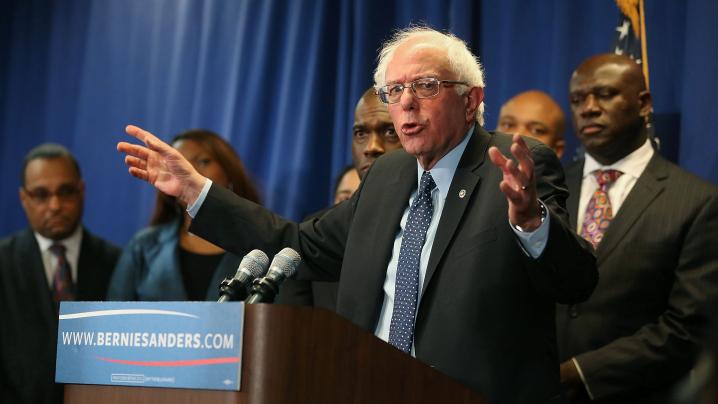[ad_1]
Democratic presidential candidate Sen. Bernie Sanders (I-Vt.) speaks while flanked by African-American religious and civic leaders after a meeting at the Freddie Gray Youth Empowerment Center on Dec. 8, 2015, in Baltimore.
Mark Wilson/Getty Images
Democratic presidential hopeful Sen. Bernie Sanders (I-Vt.) has been out on the campaign trail for months, loudly telling voters about all the not-so-hot aspects of the current state of the U.S. economy—an economy that the Obama administration has touted as strong.
Going against the administration’s many claims of an economic comeback, Sanders is calling the country’s economic system “rigged” and plagued by poverty, all the while claiming that a Sanders presidency would be a “course correction.”
Yes, Sanders dings the GOP along the way, but day after day on the stump, he’s spotlighting a litany of depressing statistics on U.S. poverty, high black youth unemployment, income inequality and unaffordable higher education.
These are not the talking points of the Obama administration.
“When you have millions of people trying to get by on 10, 9, 11 dollars an hour, you and I know no one can make it on those low wages,” Sanders said in Iowa. “We are going to create an economy that works for working families and not just the 1 percent.”
“He’s speaking our language,” said Congressional Black Caucus Chairman G.K. Butterfield (D-N.C.). Butterfield, who has endorsed Hillary Clinton, was on his way into the CBC’s weekly meeting on Capitol Hill when he spoke with The Root.
When asked whether he thought Sanders’ critique was a broadside attack on President Obama’s legacy, Butterfield emphatically said that he didn’t think the criticism was directed at the president. “It’s just political discourse,” he said, smiling.
But there are clearly some feathers being ruffled.
Sanders made Union Theological Seminary professor Cornel West, a prominent Obama critic, an introductory speaker at his rallies, and his appearance didn’t go unnoticed by Obama loyalists.
“Why is Sanders campaigning in Iowa with Cornel West, one of Obama’s biggest critics, when Obama has a 90% approval among IA Dems?” tweeted former Obama senior adviser Dan Pfeiffer the day before the Iowa caucuses.
“Sanders closing with Cornel West and embracing idea of Buyer’s Remorse with @POTUS. Be honest then Senator—run firmly against Obama record,” tweeted President Obama’s 2008 campaign manager David Plouffe the same day.
In 2011 West called the president “a black mascot of Wall Street oligarchs and a black puppet of corporate plutocrats.” That particularly brutal critique lines up with what Sanders has said about billionaires and big-bank CEOs escaping prosecution after the subprime-mortgage crisis—something the U.S. Department of Justice has taken loads of flak over.
West also launched an 18-city poverty tour with Tavis Smiley in late 2011 to focus on the 45 million Americans living in poverty. Some saw the project as a swipe at Obama.
Sanders’ embrace of West and his championing of ending income equality have pitted him against Obama’s domestic legacy. Although he does not attack the president by name, it’s hard to ignore some of the detailed points Sanders has made regarding Obama’s policies. For example, Sanders has said repeatedly that he wants to raise taxes on the rich, something that Obama said he would do but didn’t follow through on.
During the 2008 campaign, then-Sen. Obama promised that he would end the George W. Bush tax cuts and make those earning over $250,000 pay more. But Obama went on to agree to a deal in 2010 to keep the tax polices under Bush in place. Then, in 2013, a second deal between Obama and the GOP made the Bush tax cuts permanent.
Last month, Hillary Clinton’s campaign released a briefing asserting, “Sanders has a troubling history of questioning President Obama’s achievements.” That assertion is a clear attempt to get the attention of black and Democratic voters who may believe that no “course correction” from the Obama era is necessary.
While Obama’s popularity remains strong among African Americans, the economic blows that have hit the black community cannot be denied. African-American homeowners suffered a loss of over 230,000 homes as a result of the subprime-mortgage crisis after black borrowers were targeted for subprime loans. Acccording to the U.S. Census Bureau, 26 percent of African Americans (pdf) are living in poverty, and the Pew Research Center reported last year that 38 percent of black children were living below the poverty line. Obama also entered office with a national wealth gap that was 13 times worse for blacks than for whites.
In a speech in Iowa on Jan. 29, Sanders said that the current unemployment rate of 5 percent was inaccurate and that the number was really double that percentage. But low unemployment has been a particular point of pride for the Obama administration, especially since the last year of the Bush administration featured monthly job losses of 700,000.
But in his standard stump speech, Sanders has added a few more details. “Here is a tragedy no one talks about: Youth unemployment for white kids is 33 percent; Latino kids, 36 percent. For African American kids, 51 percent,” Sanders told a large crowd the weekend before the Iowa caucuses. Sanders defined these numbers as part of that aforementioned “rigged economy” of stagnant and low wages as Obama enters his last year in office.
The question is, can Sanders risk driving away black voters by tossing key parts of the Obama legacy under the bus? Clinton, who was secretary of state under Obama, has been consistent in embracing his record and has made it clear that she will continue some of his domestic policies—specifically around health care and criminal-justice reform.
But to win the Democratic nomination, Sanders must win the support of the most dedicated and reliable voting bloc of the Democratic Party: black voters. And he must win that support while at the same time saying the opposite of what the first black president is saying, thus leaving Sanders to engage in one of the most careful political dances of the 2016 election.
[ad_2]
